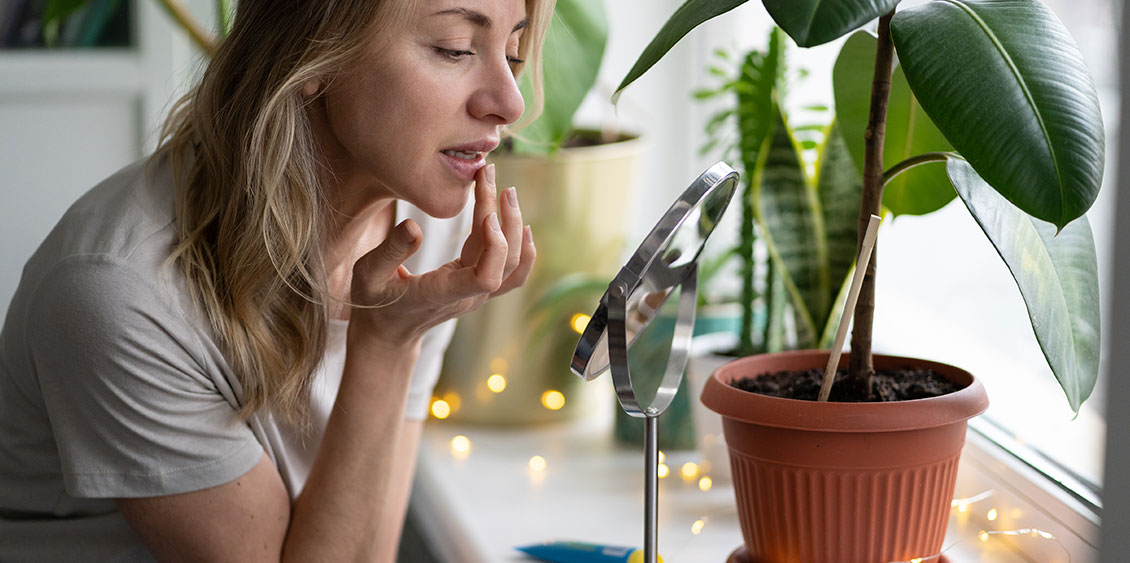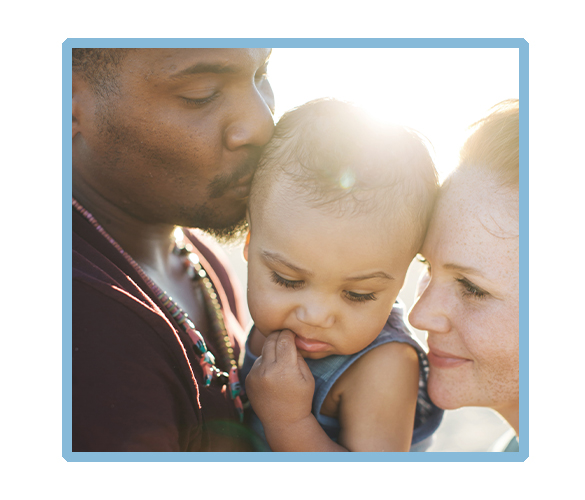Do you feel a tingling or itching sensation near your lips? This could be a sign of a cold sore forming. We explain how to recognize and treat cold sores, but also how to prevent the spread of the virus that causes them.

What causes cold sores (herpes labialis)?
Cold sores (herpes labialis) are red, fluid filled blisters (vesicles) that form when you have a herpes simplex virus infection. They most often appear on or around the lips. Up to 80% of the population has oral herpes.
The first time you come into contact with the virus, you may not have any symptoms at all. However, herpes labialis is a recurrent infection in 20% to 40% of sufferers, as the virus remains in the body for life. Those with recurring infections have two to three outbreaks a year on average.
Transmission
Herpes labialis is highly contagious. However, there are a number of steps you can take to prevent its transmission, such as:
- Avoiding close physical contact (e.g., kissing) until the cold sore goes away
- Avoiding sharing personal items (e.g., toothbrushes, utensils, makeup)
- Avoiding touching your cold sores unnecessarily
- Washing your hands after touching a cold sore
- Avoiding contact between your mouth and your partner’s genital area during sexual intercourse
How do you know if you have a cold sore?
Is it a lip pimple or a cold sore?
Cold sores go through several stages before clearing up. Recognizing the symptoms in the early stages allows you to start treatment earlier and speed up healing.
Symptoms and stages of a cold sore
|
Stages of a cold sore |
Description |
|
Prodrome |
Before a blister develops, you may feel itching, tingling, pain, or burning. This stage usually lasts for around 24 hours. Not everyone experiences symptoms at the prodrome stage. |
|
Redness |
The skin in the affected area starts to turn red. This stage can last for one to two days. |
|
Blistering |
Small, raised blisters filled with transparent fluid start to appear. The skin may also swell. |
|
Weeping and crusting |
The blisters burst, and the fluid inside dries and forms a crust. This stage may last a few days. |
|
Healing |
After about 8 to 10 days, the cold sore disappears and the skin regenerates. |
What can trigger a cold sore outbreak?
The herpes simplex virus can remain inactive in the body for a long time before it’s reactivated. That’s why herpes labialis is considered a recurrent infection. Certain factors are more likely to trigger an outbreak, including:
- Fever
- Other infections, like a cold
- Menstruation
- Fatigue
- Stress
- Exposure to sunlight or tanning booths
- Dry lips
- Injured or irritated lips
- Weakened immune system
Remember that cold sores are contagious, so you need to be careful to avoid close contact if you or someone you know has a cold sore.
How do I get rid of a cold sore fast?
Over-the-counter treatments
Cold sores are not dangerous and heal without treatment. Because of this, many people choose not to treat them. However, if you find your cold sores uncomfortable or unsightly, there are products that can shorten the healing time and limit the spread of cold sores. Two over-the-counter cold sore medications are approved for sale in Canada:
- AbrevaTM (docosanol)
- LipactinTM (zinc and heparin)
These products are most effective if you apply them as soon as you notice you’re getting a cold sore, as directed by the label. These treatments are very safe and have few side effects.
Once the cold sore has crusted over, you can apply a moisturizing product, such as a cream, ointment, or balm. This will keep you comfortable and speed up healing.
Some people try to treat their cold sores with home remedies. However, during the prodrome, redness, and blistering stages, you should only use cold sore medications. Other products could spread the infection or irritate your cold sores.
Always ask your pharmacist for advice before using over-the-counter medications.
Prescription treatments
If you tend to have several cold sore outbreaks a year, your doctor or pharmacists may prescribe you an antiviral medication. They are available in cream and tablet form. Just like over-the-counter treatments, prescription medications should be applied or taken as soon as you realize a cold sore is forming. Helpful tip: Always keep a supply of your antiviral medication on hand so you can treat outbreaks at the first sign.
Our advice
Luckily, there are a few things you can do to manage your cold sore symptoms and reduce the risk of spreading the virus:
- Don’t pop the blisters, as the fluid inside can spread the virus.
- Apply ointment to the scab to keep it moist and prevent chapping, which increases the risk of reinfection.
- Wash your hands often, especially if you tend to touch your cold sores.
- Discard makeup that has come into contact with a cold sore to prevent reinfection.
- Avoid triggers (e.g., wear sunscreen and manage your stress through breathing exercises or meditation).
Your Brunet pharmacist can help you determine whether you have a cold sore or another skin condition. If you do have a cold sore, they can help you choose the right treatment, advise you on how to care for your blisters, and let you know when you need to see a doctor.
Last updated on May 8, 2025
